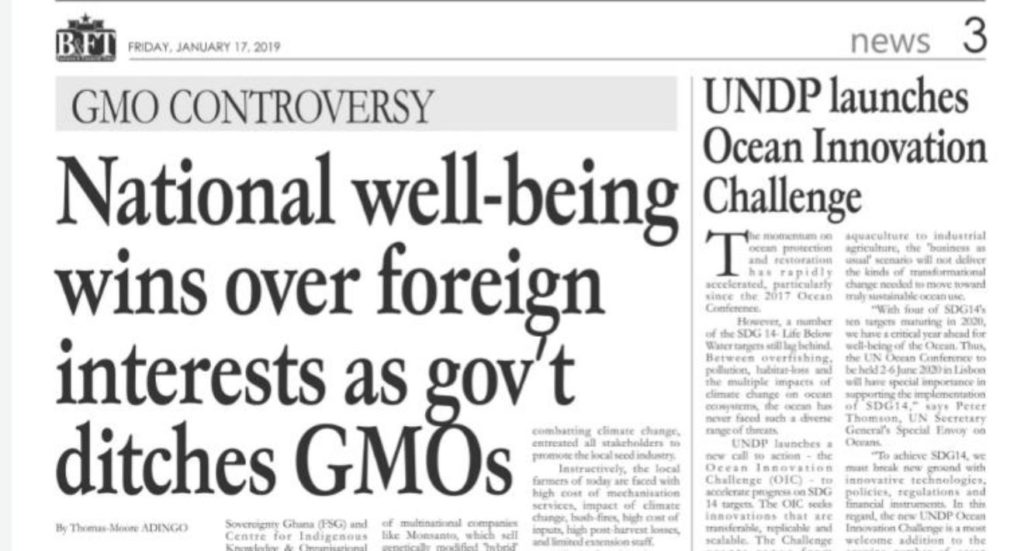The Most Important Innovation for Agriculture in Africa: Democracy

The front page headline of Ghana’s Business and Financial Times for January 17, 2020 reads: “National Well-being wins over foreign interests as the gov’t ditches GMOs.” The article quotes a dramatic statement from Ghana’s Agriculture Minister Dr. Akoto Owusu Afriyie, rejecting the need for GMO seeds in Ghana. “I’m a scientist,” said Minister Afriyie. “I believe in science. GMO is a method of science. But it’s like cracking a nut with a sledgehammer. Ghana does not need to go GMOs… Forget about GMOs. There is no GMO in what we are doing. It’s only when we have exhausted all the beautiful work done by our own scientists that we may have to fall on it, and that will be another 100 years.”
It seems the Minister of Agriculture has heard the voices of Ghana’s farmers, citizens, and local scientists, who have been organizing to develop and spread real agroecological solutions, and to express their democratic demands that the government support farmers’ interests. Bern Guri, the Director of the Center for Indigenous Knowledge and Organisational Development (CIKOD) stated: “For almost a decade CIKOD, the Peasant Farmers Association of Ghana (PFAG), and other civil society organizations in the country have been advocating for the adoption of agroecology to sustainably increase food production and improve the livelihoods of small farmers in Ghana. From the beginning we have had stiff resistance from various governments who have been greatly influenced by foreign industrialists like Monsanto, the Bill & Melinda Gates Foundation, and others to promote their products. Yesterday’s statement by the Minister for Agriculture, who has been the main proponent for GMOs, is an important achievement. But we must continue to work for a shift in the government’s budget towards support for the work of local scientists to increase local seed production as well as address the real challenges of small farmers.” Groundswell has been working closely with CIKOD as our partner in Ghana since 2011, supporting rural communities to improve their lives by strengthening community-led agroecology, local markets that incentivize agroecological production, and strengthening the movement for more supportive policies that respond to farmers’ interests.
PFAG reacted to the Ministers statement as well. “The Peasant Farmers Association of Ghana, General Agricultural Workers Union (GAWU), Food Sovereignty Ghana (FSG) and Centre for Indigenous Knowledge & Organizational Development (CIKOD) who have been championing the GMO campaign for years welcome the government position and call on all institutions, individuals and multi-national corporation who are benefiting from proceeds from MONSANTO to promote GMO in Ghana to rather join Ghanaian scientists and farmers to promote the local seed industry.” The group further encouraged government to invest more resources in agroecology as a way of developing the agricultural sector and combating climate change.
This is a dramatic example of what democratic organizing can do, especially when grounded in effective agroecological innovations developed by local farmers. It is particularly dramatic given that Ghana is a primary focus country of flagship programs of the Gates Foundation: the Alliance for a Green Revolution in Africa (AGRA), as well as the Alliance for Science based at Cornell University. The latter quickly reacted with an article posted on their website: “Scientists and farmers dispute ag ministers claim that Ghana doesn’t need GMOs.” As the article points out: “Anti-GMO activists immediately seized upon his remarks to declare an end to GMOs in Ghana. But while Afriyie is a powerful player in Ghana’s agricultural industry, the authority for GMO approval lies with Prof. Kwabena Frimpong Boateng, the minister for Environment, Science and Technology.”
In other words, they aren’t about to give up.
This brings to mind the stinging critique of philanthro-capitalists by Anand Giridharadas in his best-selling book,Winners Take All: The Elite Charade of Changing the World (2018). Giridharadas was aNew York Times journalist, former McKinsey consultant, and fellow at the Aspen Institute immersed in the world of elite philanthropy, who saw that these efforts often ignored elites’ responsibilities in contributing to the very problems the seek to solve without addressing root causes. Here is an excerpt from a 2019 interview with Giridharadas in the New Statesman.
“This ‘fake change’ is actually part of how we maintain the systems of exclusion and inequality.” …
“Even if you’ve made the money in a clean way, and you’re giving it away in the wisest ways, it’s still too much power for one person in a democratic society that is committed to people having equal power,” Giridharadas said. Rather than democratically elected governments determining social priorities, unaccountable billionaires increasingly do so. “You may say Bill Gates is a good guy in philanthropy, which I would say is true relative to some others, but he still violates the democracy principle.”
So here is a cheer for the Ghanaian civil society and farmers organizations working to promote the most essential innovation in agriculture: democracy. The only way to address the huge challenges of hunger, malnutrition and climate change is people power: agriculture and food systems of, by and for the people. Technologies matter, but the ones that work best are rooted in the creative capacity of local smallholder farmers and in authentic democracy. That is what agroecology is all about. May it grow and thrive.
By Steve Brescia, Executive Director of Groundswell International
